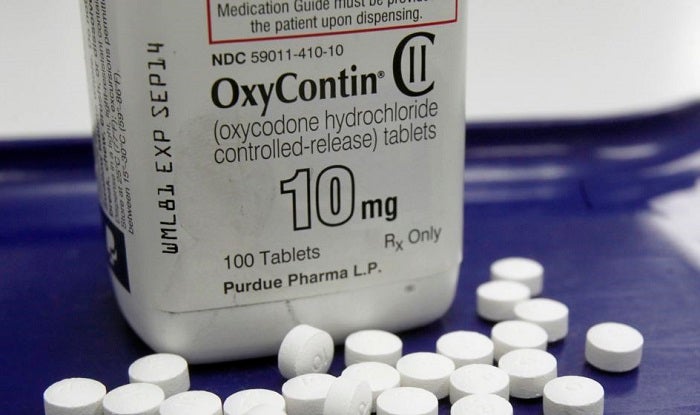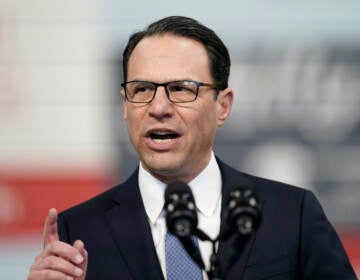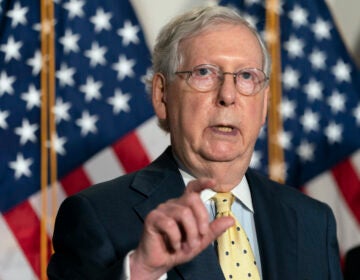Dueling legal prescriptions for opioid crisis, but will Congress spend more?
All hands will be needed on deck to stem the overdose crisis that is claiming as many lives a year as were lost in the entire Vietnam War, one lawmaker says.
Listen 4:37
Some legislation under consideration in Congress focuses on the safe disposal of prescription opioids. (AP file photo)
This month, the House of Representatives is expected to take up more than 70 opioid-related bills. It’s an election year, and many of the lawmakers who have bills ready for a vote are locked in tight re-election contests. Does that mean it’s just political theater?
Not at all, said U.S. Rep. Leonard Lance, a Central New Jersey Republican.
“I think these are extremely substantive bills, and I believe they will lead to the better health of the American nation,” Lance said.
Lance offered a bill aimed at stemming the tide of infectious diseases — including HIV and hepatitis C — that are spreading more quickly among drug users.
Some proposals deal with safe disposal of old pills, while others try to ensure the government has the best data on the crisis. Still others seek to prevent drugs from flowing in through the nation’s many points of entry – whether the southern or northern borders or via a plane or ships.
Retiring Republican U.S. Rep. Ryan Costello from Philadelphia’s western suburbs called the medley of legislation an important effort.
“All of them are probably each addressing a narrow piece of some of the challenges associated with the opiate epidemic with the thought that, by piecing them out, No. 1, you have more members speaking about these issues and identifying some of the nuances with the expectation that — as it gets over to the Senate — it may very well be in one big opiate package,” Costello said.
All hands will be needed on deck to stem the overdose crisis that is claiming as many lives a year as were lost in the entire Vietnam War, he said.
“This has to do with responsible prescribing, making sure that the prescription drug-monitoring programs are up to date, that we’re using technology in a way that prevents abuse, that we have law enforcement and the medical community and the insurance companies all singing from the same page,” Costello said.
But Costello says lawmakers also must be realistic.
“It’s also about human behavior. And so laws alone aren’t going to stop it,” he said. “I mean, the laws are trying to create guardrails so that we can help those who have the disease get the care that they need.”
Republican U.S. Rep. Lou Barletta, who is running for U.S. Senate in Pennsylvania, sponsored legislation that he says allows the Appalachian Regional Commission funding to fight the opioid epidemic. That money’s intended to help the blighted economy across Appalachia, but Barletta said the region is now facing a new kind of economic crisis.
“And it’s meant to help the effects that the opioid epidemic is having on the Appalachian region and affecting our workforce development and economic development,” he said. “It’s very hard to find workers because the Appalachian area has been hit so hard.”
Barletta says his legislation could go a long way.
“The money could be used for treatment centers. It could be used for broadband in rural areas, so they can have access to telemedicine,” he said.
But the House isn’t taking up any bills to drastically increase funding for the crisis. And Barletta’s opponent this fall, U.S. Sen. Bob Casey, D-Pennsylvania, said Barletta should co-sponsor his bill to infuse $45 billion into the crisis. Casey also accused Barletta and the GOP of undermining efforts to fight the crisis when they tried to repeal and replace Obamacare and it’s expansion of health care to low income families.
“Most folks back home need resources. And they also don’t need Medicaid expansion cut. And I think he voted for the decimation of Medicaid,” Casey said.
Still, South Jersey Republican U.S. Rep. Tom MacArthur brushes aside that criticism. This crisis isn’t a time to trade partisan jabs, he said.
“Well, I completely disagree with them. They’re conflating two things that they shouldn’t be. We are very focused on providing the resources necessary, and I hope the other party will join us in this,” MacArthur said.
The Senate is expected to take up its own version of opioid legislation later this summer or fall — and the hope is to combine all the efforts into a bill that can make it to the president’s desk.
WHYY is your source for fact-based, in-depth journalism and information. As a nonprofit organization, we rely on financial support from readers like you. Please give today.




